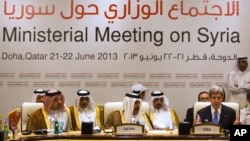DOHA —
Foreign Ministers from countries backing Syrian rebels met in Doha Saturday to better coordinate military support. U.S. Secretary of State John Kerry says they are still pushing for a political solution to the conflict.
Qatari Prime Minister Sheikh Hamad bin Jassim Al Thani says battlefield gains by forces loyal to Syrian President Bashar al-Assad show that governments backing his opponents are not doing enough. The prime minister spoke here through a translator.
"All the Arab and international efforts to end the Syrian tragedy have failed, rendering the international community a helpless observer that can not deal with the situation," Al Thani said.
The prime minister hosted a meeting of foreign ministers from France, Egypt, Germany, Italy, Jordan, Saudi Arabia, Turkey, the United Arab Emirates, the United Kingdom, and the United States -- all supporters of the opposition.
Qatar and Saudi Arabia are thought to have been arming Syrian rebels for some time, with most of those weapons passing through Jordan and Turkey. The United States is looking to start military support for Assad opponents. So this meeting was meant to sort out who is doing what.
Secretary of State Kerry says helping the opposition Supreme Military Council is not meant to diminish efforts at direct talks on a transitional authority for Syria.
"We do so not to seek a military solution," Kerry said. "We do so to come to the table and find a political settlement. Reliable civilian governance and a stronger and more effective armed opposition will better enable the opposition to be able provide the counter-weight to the initiative of Assad to reach out across borders to bring Iranians and to bring Hezbollah -- again a terrorist organization -- to the table."
Prime Minister Al Thani, who is also Qatar's foreign minister, says the Assad victory in Qusair would not have been possible without the active support of Iran and the Lebanese militia Hezbollah. Again speaking through a translator, the prime minister said Syrian rebels need more help to offset that advantage.
"The use of force may be necessary to reach rightness, the provision and use of arms might be the only way to achieve peace, especially in the Syrian case, he said. "As such, moral support alone shall not be enough for the Syrian people."
Secretary Kerry would not say what sort of weapons the United States plans to provide, explaining that all countries are choosing their own approach to increase the scope and scale of their assistance.
Rebels are asking for anti-tank and anti-aircraft missiles.
Russia is selling weapons to Assad forces and says governments that support the opposition should not arm the rebellion because it says those weapons could fall into the hands of terrorists.
Qatari Prime Minister Sheikh Hamad bin Jassim Al Thani says battlefield gains by forces loyal to Syrian President Bashar al-Assad show that governments backing his opponents are not doing enough. The prime minister spoke here through a translator.
"All the Arab and international efforts to end the Syrian tragedy have failed, rendering the international community a helpless observer that can not deal with the situation," Al Thani said.
The prime minister hosted a meeting of foreign ministers from France, Egypt, Germany, Italy, Jordan, Saudi Arabia, Turkey, the United Arab Emirates, the United Kingdom, and the United States -- all supporters of the opposition.
Qatar and Saudi Arabia are thought to have been arming Syrian rebels for some time, with most of those weapons passing through Jordan and Turkey. The United States is looking to start military support for Assad opponents. So this meeting was meant to sort out who is doing what.
Secretary of State Kerry says helping the opposition Supreme Military Council is not meant to diminish efforts at direct talks on a transitional authority for Syria.
"We do so not to seek a military solution," Kerry said. "We do so to come to the table and find a political settlement. Reliable civilian governance and a stronger and more effective armed opposition will better enable the opposition to be able provide the counter-weight to the initiative of Assad to reach out across borders to bring Iranians and to bring Hezbollah -- again a terrorist organization -- to the table."
Prime Minister Al Thani, who is also Qatar's foreign minister, says the Assad victory in Qusair would not have been possible without the active support of Iran and the Lebanese militia Hezbollah. Again speaking through a translator, the prime minister said Syrian rebels need more help to offset that advantage.
"The use of force may be necessary to reach rightness, the provision and use of arms might be the only way to achieve peace, especially in the Syrian case, he said. "As such, moral support alone shall not be enough for the Syrian people."
Secretary Kerry would not say what sort of weapons the United States plans to provide, explaining that all countries are choosing their own approach to increase the scope and scale of their assistance.
Rebels are asking for anti-tank and anti-aircraft missiles.
Russia is selling weapons to Assad forces and says governments that support the opposition should not arm the rebellion because it says those weapons could fall into the hands of terrorists.




